人教版(2019) 必修第二册 Unit 4 History and Traditions Reading and Thinking阅读课件(58张ppt,内镶嵌视频素材)
文档属性
| 名称 | 人教版(2019) 必修第二册 Unit 4 History and Traditions Reading and Thinking阅读课件(58张ppt,内镶嵌视频素材) |
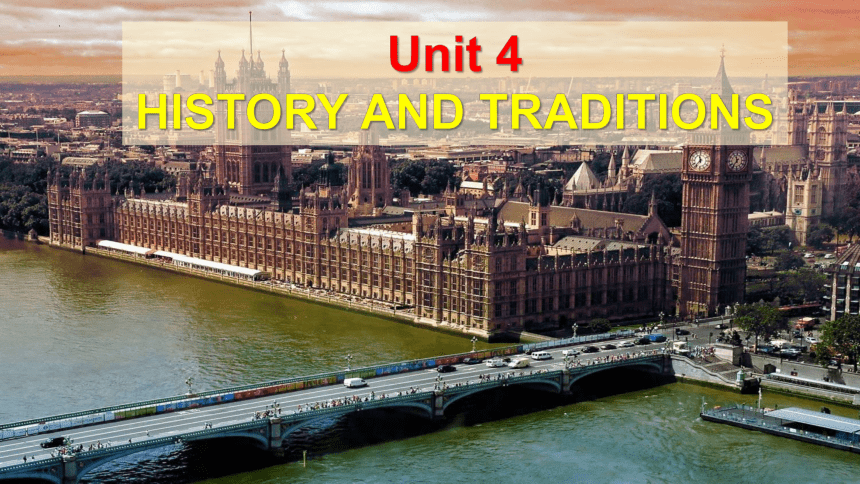
|
|
| 格式 | zip | ||
| 文件大小 | 37.3MB | ||
| 资源类型 | 教案 | ||
| 版本资源 | 人教版(2019) | ||
| 科目 | 英语 | ||
| 更新时间 | 2023-02-26 00:00:00 | ||
图片预览


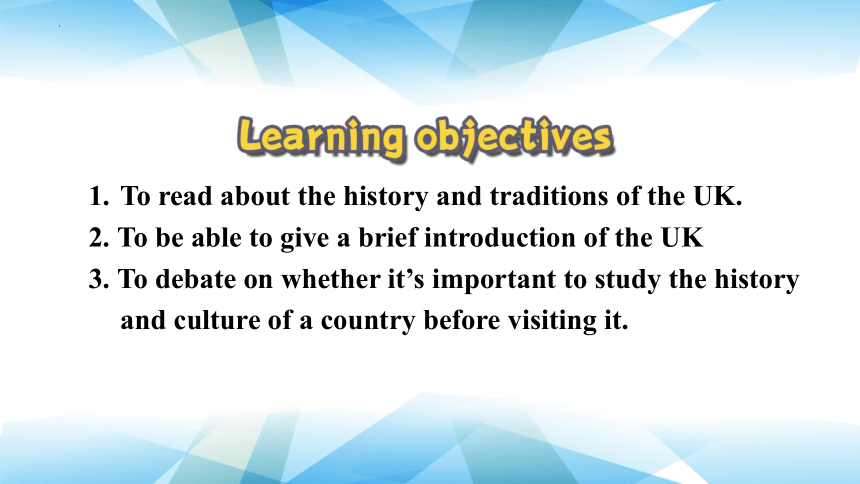
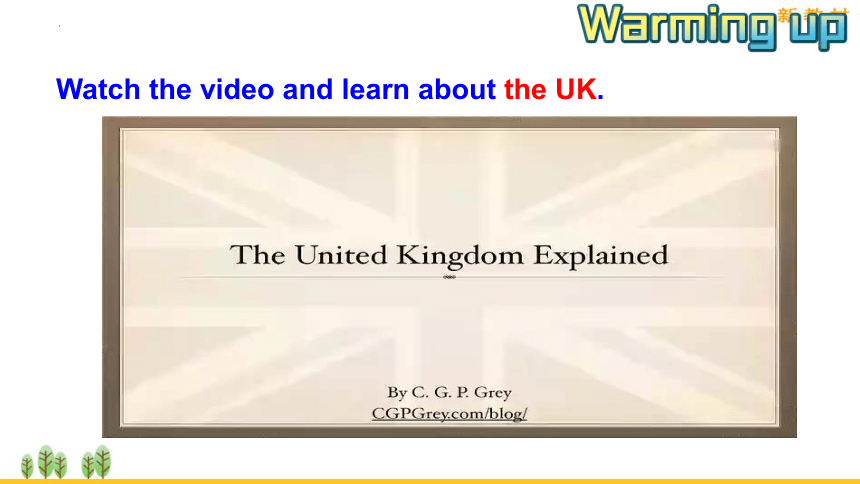
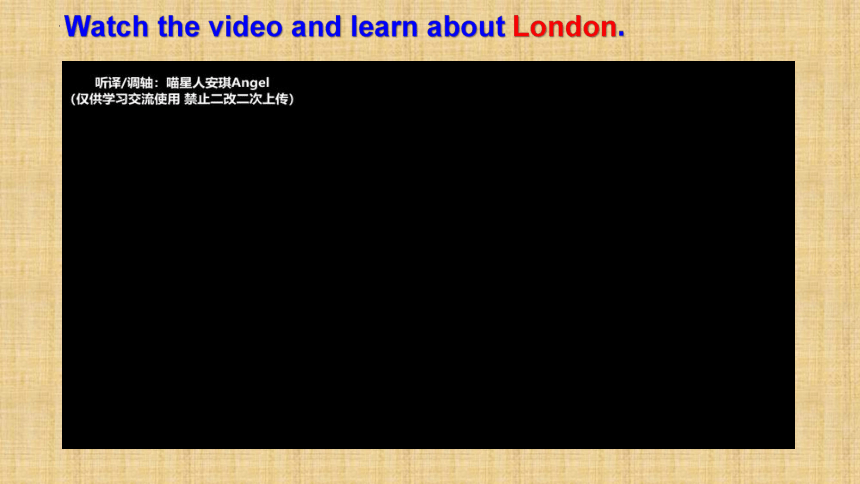
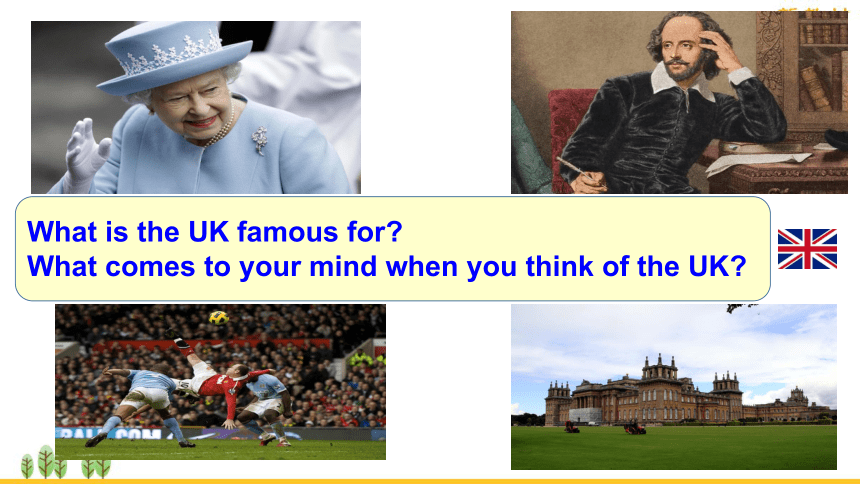
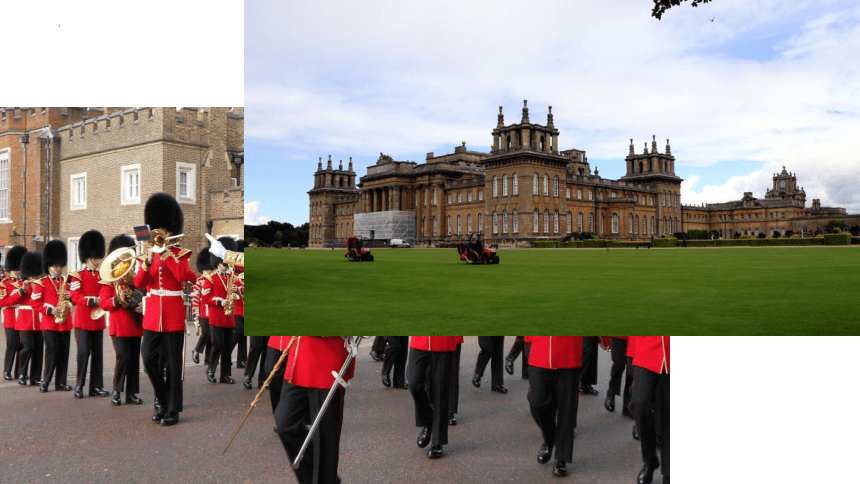
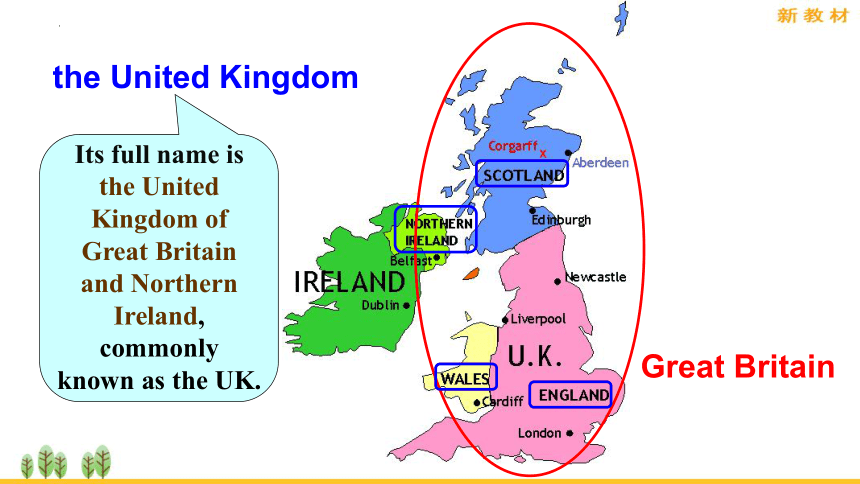
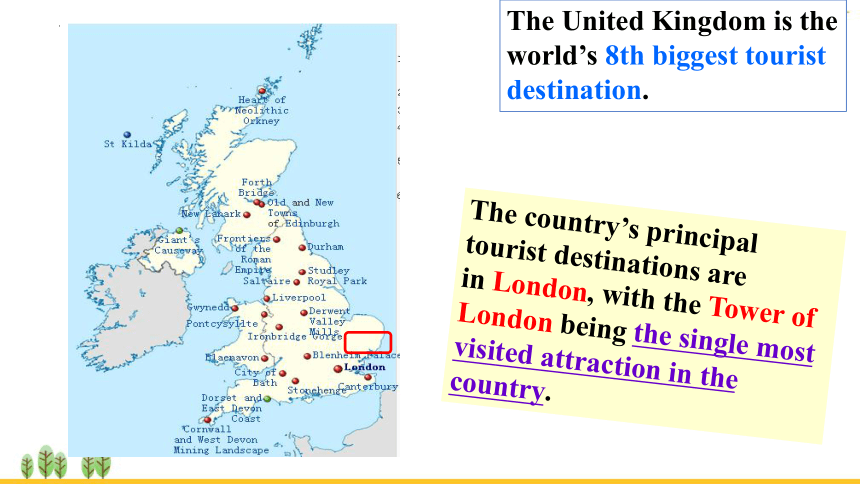
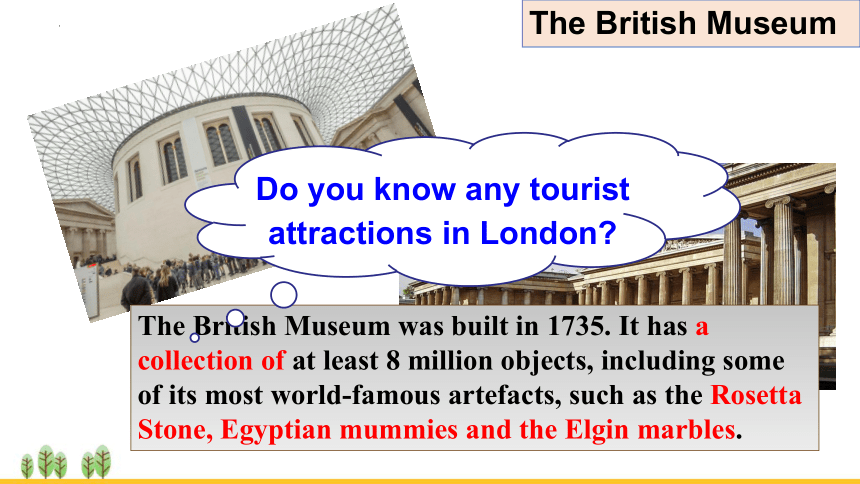
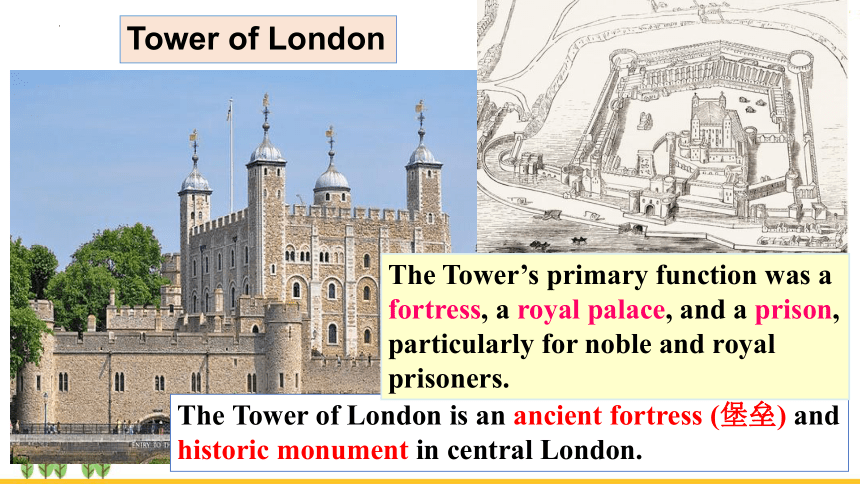
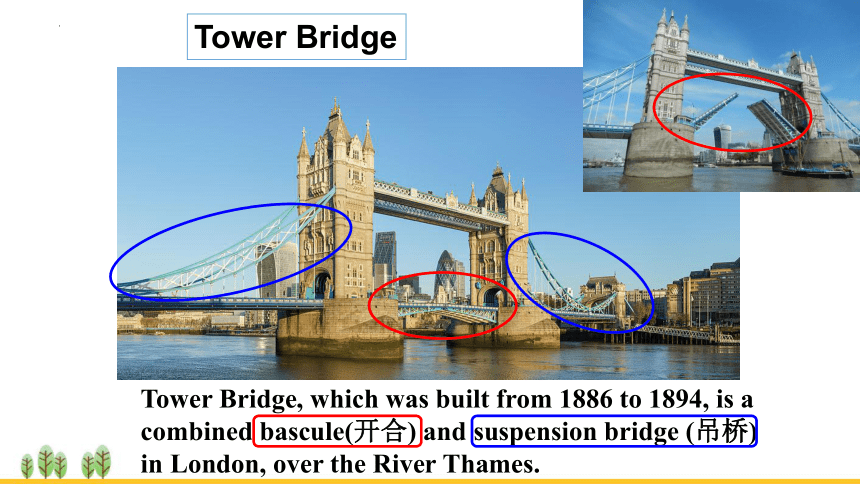
文档简介
(共58张PPT)
Unit 4
HISTORY AND TRADITIONS
WHAT’S IN A NAME
Reading and thinking
To read about the history and traditions of the UK.
2. To be able to give a brief introduction of the UK
3. To debate on whether it’s important to study the history and culture of a country before visiting it.
Watch the video and learn about the UK.
Watch the video and learn about London.
What is the UK famous for
What comes to your mind when you think of the UK
Great Britain
the United Kingdom
Its full name is the United Kingdom of Great Britain and Northern Ireland, commonly known as the UK.
The country’s principal tourist destinations are in London, with the Tower of London being the single most visited attraction in the country.
The United Kingdom is the world’s 8th biggest tourist destination.
The British Museum was built in 1735. It has a collection of at least 8 million objects, including some of its most world-famous artefacts, such as the Rosetta Stone, Egyptian mummies and the Elgin marbles.
The British Museum
Do you know any tourist attractions in London
Tower of London
The Tower of London is an ancient fortress (堡垒) and historic monument in central London.
The Tower’s primary function was a fortress, a royal palace, and a prison, particularly for noble and royal prisoners.
Tower Bridge
Tower Bridge, which was built from 1886 to 1894, is a combined bascule(开合) and suspension bridge (吊桥) in London, over the River Thames.
Tower Bridge
Tower of London
Tower Bridge is close to the Tower of London, from which it takes its name. It has become an iconic symbol (象征符号) of London.
It towers above Westminster and the Houses of Parliament giving you a fantastic bird’s eye view over all of London.
London Eye
The ride takes 30 minutes, and carries you up to a height of 135 metres.
some other tourist attractions
Big Ben
Buckingham Palace
St Paul’s Cathedral
National Gallery
Windsor Castle
Hyde Park
Look at the map, can you tell me what type of map it is What is it used for
Discuss the questions in pairs.
When you look at a map, think first about what it shows and what the map shows and what the symbols mean.
The map shows the British Isles, the islands which make up the Great Britain (England, Scotland, and Wales) and Ireland (Ireland and Northern Ireland).
It is used to show the four different countries that make up the UK and some of the major cities.
What message can you get from the title
What might “a name” here refer to
What do you expect to read in the passage
A brief introduction to the UK about its foundation and development based on geography, history and culture, etc.
Read the text and get the main idea of it.
Match each part of the text with its main idea.
1. Part 1 (Para. 1) A. Origins of the names
2. Part 2 (Para. 2) B. Advantages of studying the history
of the UK
3. Part 3 (Para. 3) C. Comparison of the four countries
of the UK
4. Part 4 (Paras. 4-5) D. Introduction of the topic.
1. What are the four countries of the United Kingdom Which two were the first to be joined together
The four countries of the United Kingdom are England, Wales, Scotland and Northern Ireland.
England and Wales were the first two to be joined together.
Read the text and answer the questions.
2. According to the text, what are two chief advantages of
studying the history of a country
The two chief advantages of studying the history of a country are to help you understand more about the country and its traditions and to make visiting it more enjoyable.
Read again to complete the timeline:
20th century
11th century
16th century
18th century
19th century
Romans arrived
Anglo-Saxons came
Vikings came
1st century
5th century
8th century
Normans came
Wales was joined
Scotland was joined
Ireland was added
Southern Ireland broke away
Sort out the information according to the timeline.
When What happened What changed
Romans arrived
Anglo-Saxons came
Vikings came
1st century
5th century
8th century
towns and roads
language and the way of building houses
vocabulary and names of locations across the UK
When What happened What changed
11th century
16th century /
18th century
Normans conquered England after the Battle of Hastings
castles built, legal system changed, and new words from French introduced
Wales was joined to Kingdom of England
Scotland was joined to England and Wales
“Kingdom of Great Britain” formed / created
When What happened What changed
19th century
20th century
Ireland was added
the southern part of Ireland broke away
“United Kingdom of Great Britain and Ireland”
formed / created
name changed to “United Kingdom of Great Britain and Northern Ireland”
Read Para. 3 carefully and find the same and different areas of the four countries of the UK.
The four countries The same areas The different areas
England, Wales, Scotland, and Northern Ireland The same flag — the Union Jack The same 1. __________ The same 2. ______________ Education system
3. ______________
Traditions:
4. ____________ and
national dish
Football team
currency
military defence
Legal system
national day
A: I can never remember what the UK means! There’s England, Britain, ___________ Great Britain!
B: Well, it helps if you remember that there are four countries that __________ the UK. That’s why it’s called the United Kingdom.
Complete the conversation about the UK using the phrases in their correct forms.
as well as, belong to, add to, join to, break away, keep your eyes open
as well as
belong to
A: Four countries I must have been asleep in that part of our history class! So the first country was England, and the others were ___________that
B: Yes, right. First England, then Wales, then Scotland. The last country was Ireland, but later the southern half didn’t want to be ___________the United Kingdom.
joined to
added to
as well as, belong to, add to, join to, break away, keep your eyes open
A: Oh, I remember now! The southern part ______________ from Northern Ireland, right
B: Yes, you got it well remembered! But ___________________ in history class next time!
broke away
keep your eyes open
as well as, belong to, add to, join to, break away, keep your eyes open
Write a summary of the text according to the clues.
become part of, join, addition, break away, evidence, the Romans,
the Anglo-Saxons,
new vocabulary, the Normans, London
In the 16th century, Wales became part of the Kingdom of England. Later Scotland joined creating the Kingdom of Great Britain. The addition of Ireland created the United Kingdom of Great Britain and Ireland. The breaking away of the southern part of Ireland in the 20th century resulted in the United Kingdom of Great Britain and Northern Ireland, which most people call the UK, Britain or Great Britain. In the UK, evidence of four ancient peoples can be found.
The Romans in the 1st century built towns and roads. Afterwards the Anglo-Saxons introduced the beginnings of the English language. Then the Vikings brought new vocabulary and place names. Lastly, the Normans in the 11th century built castles, changed the legal system and brought French words. A good place to start learning about the UK’s history is London, where past and present meet.
Discuss the questions in groups:
Is it necessary for visitors to study the history and culture of a country before visiting it
We’d better know about the history and culture, because ...
In my opinion, ...
I think that ...
In a word, ...
It’s unnecessary to prepare any cultural background, because ...
We believe that ...
I’m afraid I disagree, …
All in all, ...
VS
把……和……连接或联结起来
脱离;背叛;逃脱
属于
同(一样也);和;还
留心;留意
join … to …
break away (from sb/sth)
belong to
as well as
keep your eyes open (for)
1. So what is the difference between them, if any
那么,如果它们有区别的话,这些区别是什么呢?
if any是省略句,其完整形式为if there is any difference。
if so 如果是这样的话
if not 如果不是这样;不然,否则
if necessary 如果有必要的话
if possible 如果可能的话
if ever 如果曾经有的话
eg Correct the errors in the following sentences, if any.
【链接】
2. …, the nearby country of Wales was joined to the Kingdom of England.
nearby adj. not far away 附近的;邻近的
eg They bought some fruit from a nearby store.
他们在附近的商店买了一些水果。
nearby adv. 在附近
eg Dan found work on one of the farms nearby.
丹在附近的一个农场里找到了工作。
3. Finally, in the 20th century, the southern part of Ireland broke away from the UK, which resulted in the full name…
break away (from sb/sth )
to separate or become separate from a larger group, country, etc. 脱离;逃脱
eg Three members of the band broke away and formed their
own group.
三个成员脱离了乐队,创建了自己的组合。
break短语
break a record 打破纪录
break off 突然停止;中断(谈判)
break down 失败;(机器、车辆) 坏了
break the ice 打破僵局;打破冷场局面
break into 破门而入
break out 突发;爆发
break through 突破;突围
break up 打碎;分裂
【拓展】
3) Scientists think they are beginning to _____________ in the fight against cancer.
科学家认为他们在对抗癌症的研究中开始有所突破。
4) I was still living in London when the war ____________.
战争爆发的时候我还住在伦敦。
【语境应用】完成句子。
1) The thieves ____________________ and stole some money.
小偷闯入办公室,偷了一些钱。
2) Negotiations between the two sides __________________.
双方谈判失败了。
broke into the office
have broken down
break through
broke out
4. The four countries that belong to the United Kingdom work together in some areas.
belong vi. if sth belongs somewhere, that is the right place
or situation for it 应在(某处);适应
eg Put the chair back where it belongs.
把椅子放回原处。
belong to: if sth belongs to sb, they own it 属于
(不用于进行时态和被动语态)
eg The book belongs to Dan.
这本书是Dan的。
【拓展】
belongings n. (pl.) 财产; 所有物; 财物
personal belongings 个人财物
1) First of all, uniforms help the school look smart. The students feels that they _________ (属于) a particular group.
2) Have you ever __________________________ (是这支足球队的成员吗)
belong to
belonged to this football team
【语境应用】完成句子。
5. …, as well as share the same currency and military defence.
as well as: and in addition 同(一样也);和;还
as well as连接两个并列的主语时, 谓语动词应与as well as前面的主语在人称和数上保持一致。
eg He grows flowers as well as vegetables.
他既种菜也种花。
The editors as well as the author are working overtime.
编辑和作者都在加班工作。
【链接】
as well as 和……一样好, 为比较结构。
【语境应用】翻译句子。
1) 电既可以变为声能,又可以变为光能。
Electric energy can be changed into light energy as well as into sound energy.
2) 你别指望她除了照顾孩子外, 还做家务活。
You cannot expect her to do the housework as well as look after the children.
denfence n. protection or support against attack, criticism or
infection 防御;保卫
eg The towers were once an important part of the city’s defences.
那些高塔曾经是该市防御体系中重要的组成部分。
in defence of ... 保卫……;为……辩护
eg They took up arms in defence of their country.
他们拿起武器保卫祖国。
All I can say, in defence of my actions, is that I had little
choice. 我只能以别无选择来为自己的行为辩解。
【拓展】
6. … and Northern Ireland all have different education systems and legal systems.
legal adj. if sth is legal, you are allowed to do it or have to do
it by law 法律允许的,合法的
eg legal action / proceedings 法律诉讼
What the company has done is perfectly legal.
公司所做的这一切完全是合法的。
【拓展】
illegal adj.
not allowed by the law
违法的
eg It is illegal to sell
tobacco to someone
under 18.
出售烟草给18岁以下
者是违法的。
7. … you will be surrounded by evidence of four different groups of people who took over at different times ...
surround vt. to be all around sb or sth on every side
围绕,环绕,包围
surround oneself with 喜欢身边总有……
be surrounded by / with 周围都是……
surround ... with ... 用……把……围住
【链接】 surrounding adj. 周围的,附近的
surroundings n. 环境
【语境应用】 用surround的适当形式填空。
1) Lucy was sitting on the floor ___________ by toys.
2) We decided to explore the ___________ countryside.
3) When he came back to life, he found himself ___________ by enemy soldiers.
4) It’s important to work in friendly _____________.
surrounded
surrounded
surrounding
surroundings
8. They conquered England after the well-known Battle of Hastings in the 11th century.
battle n. a fight between armed forces 战役;搏斗
eg Her son was killed in battle.
她儿子在战斗中阵亡。
battle v. to try very hard to achieve sth that is difficult or
dangerous 搏斗;奋斗
eg She had battled against cancer.
她勇敢地与癌症抗争。
9. If you keep your eyes open, you will be surprised to find that you can see both its past and its present.
keep your eyes open (for): keep an eye on
留心;留意
eg Keep your eyes open for a boy in a red cap and coat.
留意一下一个戴着红色帽子、穿着红色外套的男孩。
【拓展】keep短语
keep up 坚持;维持
keep up with 跟上, 不落在……后面; 了解; 保持联系
keep off 挡住; (使)避开
keep on 继续(干); 坚持(干)
keep back 退缩;隐瞒;阻止
keep sb. from (doing) sth. 阻止某人做某事
keep out 把……关在外面;阻止;不参加
【语境应用】用keep短语的适当形式填空。
1) Bill had to work hard to _________.
2) Employees need to ____________ the latest technical developments.
3) You just have to __________ trying.
4) I got the feeling he was ________ something _______.
5) I hope I haven’t ______ you ______ your work.
keep up
keep up with
keep on
back
from
keeping
kept
Make a booklet for foreign visitors coming to China with contents below:
What important things should they know about before the trip
What do they need to pay attention to in order to avoid cultural conflict
How can they find information about Chinese culture on the Internet
Unit 4
HISTORY AND TRADITIONS
WHAT’S IN A NAME
Reading and thinking
To read about the history and traditions of the UK.
2. To be able to give a brief introduction of the UK
3. To debate on whether it’s important to study the history and culture of a country before visiting it.
Watch the video and learn about the UK.
Watch the video and learn about London.
What is the UK famous for
What comes to your mind when you think of the UK
Great Britain
the United Kingdom
Its full name is the United Kingdom of Great Britain and Northern Ireland, commonly known as the UK.
The country’s principal tourist destinations are in London, with the Tower of London being the single most visited attraction in the country.
The United Kingdom is the world’s 8th biggest tourist destination.
The British Museum was built in 1735. It has a collection of at least 8 million objects, including some of its most world-famous artefacts, such as the Rosetta Stone, Egyptian mummies and the Elgin marbles.
The British Museum
Do you know any tourist attractions in London
Tower of London
The Tower of London is an ancient fortress (堡垒) and historic monument in central London.
The Tower’s primary function was a fortress, a royal palace, and a prison, particularly for noble and royal prisoners.
Tower Bridge
Tower Bridge, which was built from 1886 to 1894, is a combined bascule(开合) and suspension bridge (吊桥) in London, over the River Thames.
Tower Bridge
Tower of London
Tower Bridge is close to the Tower of London, from which it takes its name. It has become an iconic symbol (象征符号) of London.
It towers above Westminster and the Houses of Parliament giving you a fantastic bird’s eye view over all of London.
London Eye
The ride takes 30 minutes, and carries you up to a height of 135 metres.
some other tourist attractions
Big Ben
Buckingham Palace
St Paul’s Cathedral
National Gallery
Windsor Castle
Hyde Park
Look at the map, can you tell me what type of map it is What is it used for
Discuss the questions in pairs.
When you look at a map, think first about what it shows and what the map shows and what the symbols mean.
The map shows the British Isles, the islands which make up the Great Britain (England, Scotland, and Wales) and Ireland (Ireland and Northern Ireland).
It is used to show the four different countries that make up the UK and some of the major cities.
What message can you get from the title
What might “a name” here refer to
What do you expect to read in the passage
A brief introduction to the UK about its foundation and development based on geography, history and culture, etc.
Read the text and get the main idea of it.
Match each part of the text with its main idea.
1. Part 1 (Para. 1) A. Origins of the names
2. Part 2 (Para. 2) B. Advantages of studying the history
of the UK
3. Part 3 (Para. 3) C. Comparison of the four countries
of the UK
4. Part 4 (Paras. 4-5) D. Introduction of the topic.
1. What are the four countries of the United Kingdom Which two were the first to be joined together
The four countries of the United Kingdom are England, Wales, Scotland and Northern Ireland.
England and Wales were the first two to be joined together.
Read the text and answer the questions.
2. According to the text, what are two chief advantages of
studying the history of a country
The two chief advantages of studying the history of a country are to help you understand more about the country and its traditions and to make visiting it more enjoyable.
Read again to complete the timeline:
20th century
11th century
16th century
18th century
19th century
Romans arrived
Anglo-Saxons came
Vikings came
1st century
5th century
8th century
Normans came
Wales was joined
Scotland was joined
Ireland was added
Southern Ireland broke away
Sort out the information according to the timeline.
When What happened What changed
Romans arrived
Anglo-Saxons came
Vikings came
1st century
5th century
8th century
towns and roads
language and the way of building houses
vocabulary and names of locations across the UK
When What happened What changed
11th century
16th century /
18th century
Normans conquered England after the Battle of Hastings
castles built, legal system changed, and new words from French introduced
Wales was joined to Kingdom of England
Scotland was joined to England and Wales
“Kingdom of Great Britain” formed / created
When What happened What changed
19th century
20th century
Ireland was added
the southern part of Ireland broke away
“United Kingdom of Great Britain and Ireland”
formed / created
name changed to “United Kingdom of Great Britain and Northern Ireland”
Read Para. 3 carefully and find the same and different areas of the four countries of the UK.
The four countries The same areas The different areas
England, Wales, Scotland, and Northern Ireland The same flag — the Union Jack The same 1. __________ The same 2. ______________ Education system
3. ______________
Traditions:
4. ____________ and
national dish
Football team
currency
military defence
Legal system
national day
A: I can never remember what the UK means! There’s England, Britain, ___________ Great Britain!
B: Well, it helps if you remember that there are four countries that __________ the UK. That’s why it’s called the United Kingdom.
Complete the conversation about the UK using the phrases in their correct forms.
as well as, belong to, add to, join to, break away, keep your eyes open
as well as
belong to
A: Four countries I must have been asleep in that part of our history class! So the first country was England, and the others were ___________that
B: Yes, right. First England, then Wales, then Scotland. The last country was Ireland, but later the southern half didn’t want to be ___________the United Kingdom.
joined to
added to
as well as, belong to, add to, join to, break away, keep your eyes open
A: Oh, I remember now! The southern part ______________ from Northern Ireland, right
B: Yes, you got it well remembered! But ___________________ in history class next time!
broke away
keep your eyes open
as well as, belong to, add to, join to, break away, keep your eyes open
Write a summary of the text according to the clues.
become part of, join, addition, break away, evidence, the Romans,
the Anglo-Saxons,
new vocabulary, the Normans, London
In the 16th century, Wales became part of the Kingdom of England. Later Scotland joined creating the Kingdom of Great Britain. The addition of Ireland created the United Kingdom of Great Britain and Ireland. The breaking away of the southern part of Ireland in the 20th century resulted in the United Kingdom of Great Britain and Northern Ireland, which most people call the UK, Britain or Great Britain. In the UK, evidence of four ancient peoples can be found.
The Romans in the 1st century built towns and roads. Afterwards the Anglo-Saxons introduced the beginnings of the English language. Then the Vikings brought new vocabulary and place names. Lastly, the Normans in the 11th century built castles, changed the legal system and brought French words. A good place to start learning about the UK’s history is London, where past and present meet.
Discuss the questions in groups:
Is it necessary for visitors to study the history and culture of a country before visiting it
We’d better know about the history and culture, because ...
In my opinion, ...
I think that ...
In a word, ...
It’s unnecessary to prepare any cultural background, because ...
We believe that ...
I’m afraid I disagree, …
All in all, ...
VS
把……和……连接或联结起来
脱离;背叛;逃脱
属于
同(一样也);和;还
留心;留意
join … to …
break away (from sb/sth)
belong to
as well as
keep your eyes open (for)
1. So what is the difference between them, if any
那么,如果它们有区别的话,这些区别是什么呢?
if any是省略句,其完整形式为if there is any difference。
if so 如果是这样的话
if not 如果不是这样;不然,否则
if necessary 如果有必要的话
if possible 如果可能的话
if ever 如果曾经有的话
eg Correct the errors in the following sentences, if any.
【链接】
2. …, the nearby country of Wales was joined to the Kingdom of England.
nearby adj. not far away 附近的;邻近的
eg They bought some fruit from a nearby store.
他们在附近的商店买了一些水果。
nearby adv. 在附近
eg Dan found work on one of the farms nearby.
丹在附近的一个农场里找到了工作。
3. Finally, in the 20th century, the southern part of Ireland broke away from the UK, which resulted in the full name…
break away (from sb/sth )
to separate or become separate from a larger group, country, etc. 脱离;逃脱
eg Three members of the band broke away and formed their
own group.
三个成员脱离了乐队,创建了自己的组合。
break短语
break a record 打破纪录
break off 突然停止;中断(谈判)
break down 失败;(机器、车辆) 坏了
break the ice 打破僵局;打破冷场局面
break into 破门而入
break out 突发;爆发
break through 突破;突围
break up 打碎;分裂
【拓展】
3) Scientists think they are beginning to _____________ in the fight against cancer.
科学家认为他们在对抗癌症的研究中开始有所突破。
4) I was still living in London when the war ____________.
战争爆发的时候我还住在伦敦。
【语境应用】完成句子。
1) The thieves ____________________ and stole some money.
小偷闯入办公室,偷了一些钱。
2) Negotiations between the two sides __________________.
双方谈判失败了。
broke into the office
have broken down
break through
broke out
4. The four countries that belong to the United Kingdom work together in some areas.
belong vi. if sth belongs somewhere, that is the right place
or situation for it 应在(某处);适应
eg Put the chair back where it belongs.
把椅子放回原处。
belong to: if sth belongs to sb, they own it 属于
(不用于进行时态和被动语态)
eg The book belongs to Dan.
这本书是Dan的。
【拓展】
belongings n. (pl.) 财产; 所有物; 财物
personal belongings 个人财物
1) First of all, uniforms help the school look smart. The students feels that they _________ (属于) a particular group.
2) Have you ever __________________________ (是这支足球队的成员吗)
belong to
belonged to this football team
【语境应用】完成句子。
5. …, as well as share the same currency and military defence.
as well as: and in addition 同(一样也);和;还
as well as连接两个并列的主语时, 谓语动词应与as well as前面的主语在人称和数上保持一致。
eg He grows flowers as well as vegetables.
他既种菜也种花。
The editors as well as the author are working overtime.
编辑和作者都在加班工作。
【链接】
as well as 和……一样好, 为比较结构。
【语境应用】翻译句子。
1) 电既可以变为声能,又可以变为光能。
Electric energy can be changed into light energy as well as into sound energy.
2) 你别指望她除了照顾孩子外, 还做家务活。
You cannot expect her to do the housework as well as look after the children.
denfence n. protection or support against attack, criticism or
infection 防御;保卫
eg The towers were once an important part of the city’s defences.
那些高塔曾经是该市防御体系中重要的组成部分。
in defence of ... 保卫……;为……辩护
eg They took up arms in defence of their country.
他们拿起武器保卫祖国。
All I can say, in defence of my actions, is that I had little
choice. 我只能以别无选择来为自己的行为辩解。
【拓展】
6. … and Northern Ireland all have different education systems and legal systems.
legal adj. if sth is legal, you are allowed to do it or have to do
it by law 法律允许的,合法的
eg legal action / proceedings 法律诉讼
What the company has done is perfectly legal.
公司所做的这一切完全是合法的。
【拓展】
illegal adj.
not allowed by the law
违法的
eg It is illegal to sell
tobacco to someone
under 18.
出售烟草给18岁以下
者是违法的。
7. … you will be surrounded by evidence of four different groups of people who took over at different times ...
surround vt. to be all around sb or sth on every side
围绕,环绕,包围
surround oneself with 喜欢身边总有……
be surrounded by / with 周围都是……
surround ... with ... 用……把……围住
【链接】 surrounding adj. 周围的,附近的
surroundings n. 环境
【语境应用】 用surround的适当形式填空。
1) Lucy was sitting on the floor ___________ by toys.
2) We decided to explore the ___________ countryside.
3) When he came back to life, he found himself ___________ by enemy soldiers.
4) It’s important to work in friendly _____________.
surrounded
surrounded
surrounding
surroundings
8. They conquered England after the well-known Battle of Hastings in the 11th century.
battle n. a fight between armed forces 战役;搏斗
eg Her son was killed in battle.
她儿子在战斗中阵亡。
battle v. to try very hard to achieve sth that is difficult or
dangerous 搏斗;奋斗
eg She had battled against cancer.
她勇敢地与癌症抗争。
9. If you keep your eyes open, you will be surprised to find that you can see both its past and its present.
keep your eyes open (for): keep an eye on
留心;留意
eg Keep your eyes open for a boy in a red cap and coat.
留意一下一个戴着红色帽子、穿着红色外套的男孩。
【拓展】keep短语
keep up 坚持;维持
keep up with 跟上, 不落在……后面; 了解; 保持联系
keep off 挡住; (使)避开
keep on 继续(干); 坚持(干)
keep back 退缩;隐瞒;阻止
keep sb. from (doing) sth. 阻止某人做某事
keep out 把……关在外面;阻止;不参加
【语境应用】用keep短语的适当形式填空。
1) Bill had to work hard to _________.
2) Employees need to ____________ the latest technical developments.
3) You just have to __________ trying.
4) I got the feeling he was ________ something _______.
5) I hope I haven’t ______ you ______ your work.
keep up
keep up with
keep on
back
from
keeping
kept
Make a booklet for foreign visitors coming to China with contents below:
What important things should they know about before the trip
What do they need to pay attention to in order to avoid cultural conflict
How can they find information about Chinese culture on the Internet
